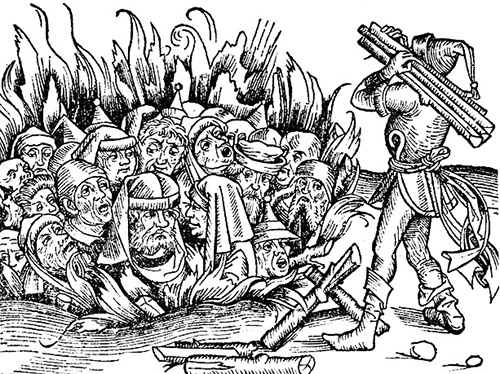
This time of year marks 926 years since the massacres of the Rhineland Jewish communities in the First Crusade, and 875 since the anti-Jewish massacres of the Second Crusade. Given the ferocity and cruelty exhibited toward the Jews by the French and German burghers and peasantry, the question is asked: Why is it that Jews in Medieval Ashkenaz kept on coming back to their destroyed communities to rebuild? Why didn’t they run away to the Ottoman Empire once that empire came into being and where the Ottomans treated Jews relatively nicely? (The Ottomans didn’t host the Jews out of philosemitism, it should be noted; they needed the Jews more than the Jews needed them.)
Well, I don’t have the answer to that question, but I can tell you that some Ashkenazim themselves were puzzled by the illogical habitation of Jews in such a hateful environment.
As the German-Jewish historian Tzvi (Heinrich) Graetz put it:
“When contrasted with the miserable conditions of the Jews in Germany, the lot of those who had taken up their abode in the newly risen Turkish empire must have seemed unalloyed happiness. Jewish immigrants who had escaped the ceaseless persecutions to which they had been subjected in Germany expressed themselves in terms of rapture over the happy conditions of the Turkish Jews. Unlike their co-coreligionists under Christian rule, they were not compelled to yield up the third part of their fortunes in royal taxes; nor were they in any way hindered in the conduct of business. They were permitted absolute freedom of movement throughout the breadth and length of the empire. They were subject to no sumptuary laws and were thus able to clothe themselves in silk and gold if they chose.”
Turkey was, in short, correctly described by an enthusiastic Jew as a land “in which nothing, absolutely nothing, is wanting.” Two young immigrants, Kalman and David, thought that if German Jews realized but a tenth of the happiness to be found in Turkey, they would brave any hardships to get there. These two young men persuaded Isaac Sarfati who had journeyed in Turkey in earlier times, and whose name was by no means unknown in Germany, to write a circular letter to the Jews of the Rhineland, Styria, Moravia and Hungary to acquaint them with a happy lot of the Jews under the crescent as compared with the hard fate under the shadow of the cross, and to call upon them to escape from the German house of bondage and emigrate to Turkey. The lights and shadows of his subject could not have been more sharply defined than they are in Sarfati’s letter (written in 1456), whose graphic, often somewhat too artificial, language does not readily lend itself to translation:
“I have heard of the afflictions, more bitter than death, that have befallen our brethren in Germany—of the tyrannical laws, the compulsory baptisms, and the banishments. And when they flee from one place, a yet harder fate befalls them in another. I hear an insolent people raising its voice in fury against the faithful; I see its hand uplifted to smite them. On all sides, I learn of the anguish of soul and torment of the body; of daily exactions levied by merciless extortioners. The clergy and the monks, false priests, rise up against the unhappy people of God and say: ‘let us pursue them even unto destruction, let the name of Israel be known no more among men.’ They imagine that their faith is in danger because the Jews in Jerusalem might, per-adventure, buy the Church of the Holy Sepulcher [eventually this did happen]. For this reason, they have made a law, that every Jew found upon a Christian ship bound for the east shall be flung into the sea. Alas! How evilly are the people of God in Germany entreated; how sadly is their strength departed! They are driven hither and thither and pursued even unto death. The sword of the oppressor ever hangs over their heads. Brothers and teachers! Friends and acquaintances! I, Isaac Sarfati, from French stock, born in Germany, where I sat at the feet of my teachers, I proclaim to you that Turkey is a land wherein nothing is lacking. If ye will, all shall yet be well with you. The way to the holy land lies open to you through Turkey. Is it not better for you to live under Moslems than under Christians? Here every man dwells in peace under his vine and fig tree. In Christendom, on the contrary, ye dare not clothe your children in red or in blue, according to your taste, without exposing them to insult and yourselves to extortion; and therefore are ye condemned to go about meanly clad in sad colored raiment. All your days are full of sorrow, even your Sabbaths and holidays. Strangers enjoy your goods; and therefore of what profit is the wealth of your rich men [Jefferson and John Locke, eat your hearts out]. They hoard it but to their own sorrow, and in one day it is lost to them forever. Ye call your riches your own? Alas! They belong to your oppressors. They bring false accusations against you. They respect neither age nor wisdom, and though they gave you a pledge you sealed sixtyfold, yet would they break it. They continually lay double punishments upon you, a death of torment, and confiscation of goods. They prohibit teaching in your schools; they break in upon you during your hours of prayer, and they forbid you to work or conduct your business on Christian feast-days. And now seeing all these things, O Israel, wherefore sleepest thou? Arise, and leave this accursed land forever!”
Isaac Sarfati’s appeal induced many Jews to emigrate forthwith to Turkey and Palestine. Their grave demeanor, extreme piety, and peculiar apparel at once distinguished them from the Jews of Greece and the Orient, and before long, the newcomers exercised considerable influence upon the other inhabitants of the countries in which they settled.
But lest one think that conditions for Jews in the Land of Israel were utopia:
There were peculiar circumstances connected with the prohibition of the emigration of the Jews to Palestine. The Jewish inhabitants of Jerusalem had obtained permission from a Pacha to build a synagogue on one of the slopes of Mount Zion. The site of this synagogue adjoined a piece of land owned by Franciscan monks. The monks raised a clamor, again raising the fear that the Jews would occupy the Holy Sepulcher. (Hmmm…this sounds familiar.)
The Pope issued a bull prohibiting any Catholic shipowners (most of whom were conveniently Venetians) to transport Jews to the east.
To be continued…
The author can be reached at [email protected].
By Joel Davidi Weisberger










